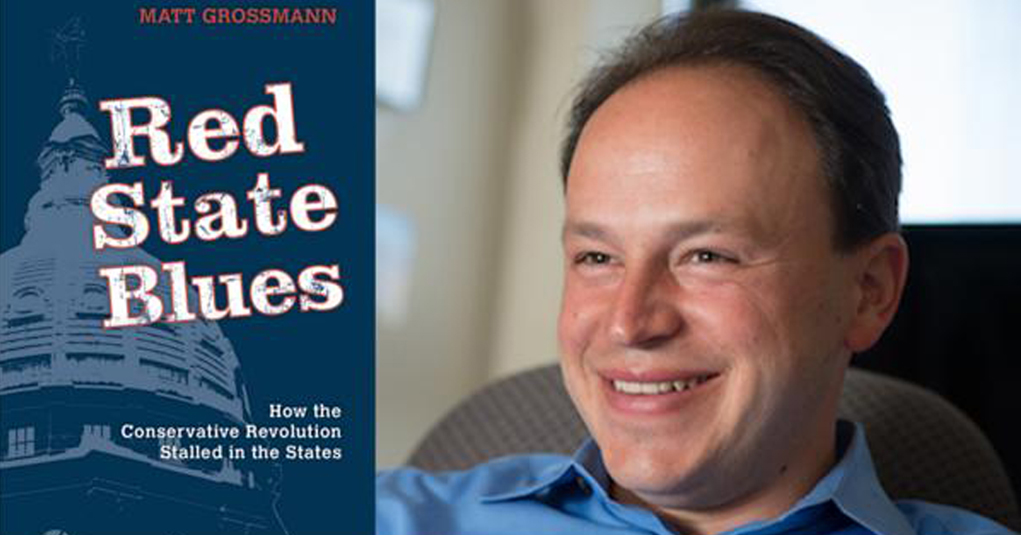Republicans have overtaken Democratic control of state legislatures across the country, but strict conservative policies haven’t found complete favor with the public, a new book from a Michigan State University author asserts.
Republicans have been able to slow the growth of government, but not bring it to a complete halt, said  Matt Grossmann, director of MSU’s Institute for Public Policy and Social Research, and author of the newly published Red State Blues.
Matt Grossmann, director of MSU’s Institute for Public Policy and Social Research, and author of the newly published Red State Blues.
The book, subtitled How the Conservative Revolution Stalled in the States, was reviewed for the first time on the latest IPPSR State of the State Podcast. Listen in here.
Grossmann’s latest book, his fourth, was published by Cambridge University Press. He’s co-author of Asymmetric Politics: Ideological Republicans and Group Interest Democrats, winner of the Leon Epstein Outstanding Book Award from the American Political Science Association.
His previous books include Artists of the Possible: Governing Networks and American Policy Change Since 1945, The Not-So-Special Interests: Interest Groups, Public Representation and American Governance. He is co-author of Campaigns & Elections, the leading elections textbook.
The monthly podcast features Grossmann, MSU Economics Professor Charles Ballard and IPPSR Associate Director Arnold Weinfeld, with special guests, swapping views on politics, the economy and the state of the state and the world.
This month’s conversation with Ballard moved from Michigan’s economy to policy changes on a partisan stage. Grossmann’s latest work traces Republican control in three states in 1992 to a takeover of 26 states by 2017. Recent Democratic gains have only brought the party back to 2014 status.
Republican control, however, had had limited effects. “The story is not as successful as it’s sometimes told…. It’s very hard to do anything about reversing the growth and the size and scope of state government,” Grossmann said.
The public reacted quickly with increased spending or higher taxes where conservative cost-cutting closed schools, Grossmann noted.
“People like the idea in general of lower taxes and less government spending. They really don’t like closed schools,” he said. “Even Republican legislators often reverse themselves when that news comes to voters.”
While hard-fought election campaigns may pledge bold change, full single-party control moves public policy about 1 percent in that party’s direction, Grossmann said. “You see real effects, but they’re not overwhelming.”
Strict conservative legislation governing state-level immigration, gun control legislation, abortion and criminal justice measures have largely been limited or reversed, Grossmann found.
Smaller states saw relatively less change, while larger states could see greater effects. Wisconsin, among large states nationally and measured as the fifth most liberal state by economic policy, saw some of the greatest changes.
Wisconsin’s citizens were of more moderate opinions than enacted policies, Grossmann said. “They (Republicans) were able to move it more there than elsewhere.”.
Early childhood education, seen as a traditional expansion of government responsibility, was another winner despite conservative resistance, Grossmann said. Almost every governor elected last year promised to increase spending for the youngest learners and almost all kept the promise, he added.